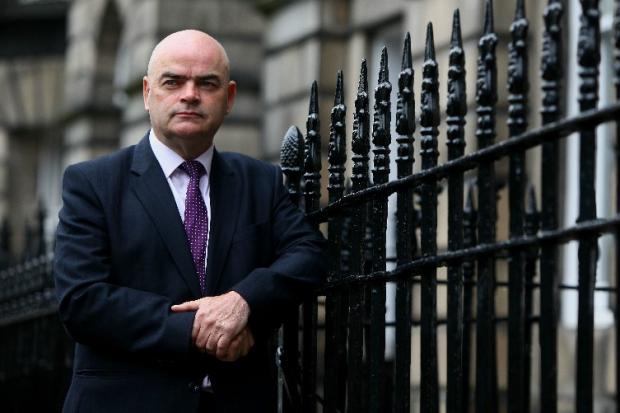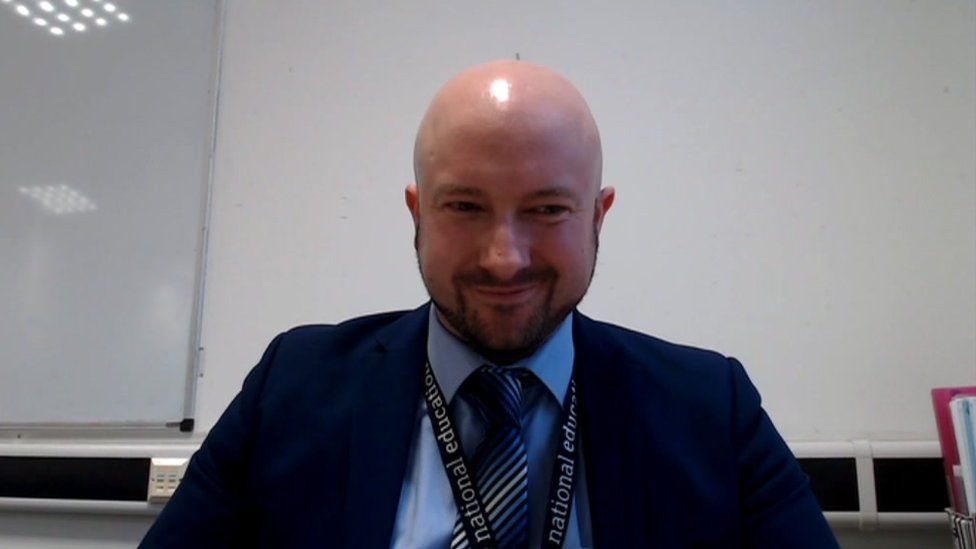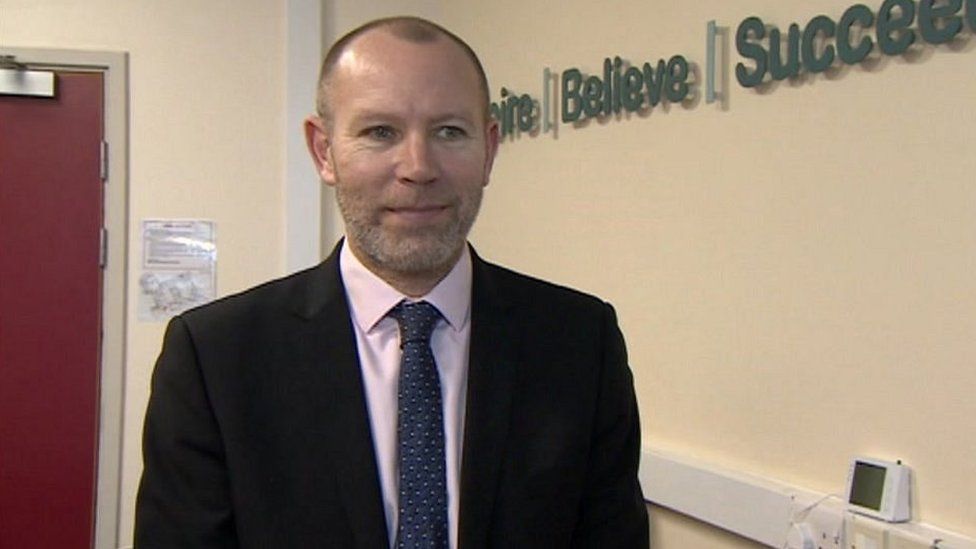SCOTLAND
Face masks in high schools: Nicola Sturgeon warned by EIS
By John-Paul Holden
By John-Paul Holden
10th February

High school pupils will be able to take off their masks in classrooms at the end of the month.
Union bosses have warned that the relaxation of Covid-related face mask requirements in high schools is happening too quickly.
The change, announced on Thursday by Nicola Sturgeon, means pupils and teachers will no longer need to wear coverings in secondary classrooms from the end of this month.
It will come into effect from February 28, when all schools have returned following the half-term break. The First Minister has described the move as a "further step in allowing children and young people a return to a more normal experience in school after many, many months of sacrifice".
But leaders at the EIS, Scotland's largest teaching union, said current requirements should be retained throughout the winter period and until the end of March.
Face coverings will still be needed in other communal, indoor areas within high schools. However, Ms Sturgeon stressed this would be kept under "regular review".
Prime Minister Boris Johnson has already announced that the last domestic restrictions in England - including the legal requirement to self-isolate if you test positive - will likely be lifted later this month, "a full month early".
The First Minister said the requirement for face coverings in classrooms was being relaxed following the latest advice from an expert group, which considered the matter on Tuesday.
READ MORE: Classroom 'door chopping' - 'No mention' in Covid guidance
Ms Sturgeon, who announced the change at the start of First Minister's Questions at Holyrood, said the move would "reduce barriers to communication in the classroom and reduce any wellbeing impacts which arise from the use of face coverings". She added that it had been made possible by "reducing case rates" for coronavirus in secondary school-aged children, as well as the decrease in hospital admission rates among all ages.
However, EIS leaders have expressed concern. Larry Flanagan, general secretary, said: “The majority of EIS members supported the retention of face coverings until we were through the winter period so we would have preferred the end of March rather than the end of February for this change to happen.
“Having said that, it is important that both pupils and staff have the right to continue to wear face coverings if they wish and, in some cases, where there is a heightened vulnerability in play, face coverings may still be required.”
Mr Flanagan added: “There has been a slight drop in infection levels within schools but they remain high – over 4,000 staff are off school for Covid related reasons and more than 20,000 pupils.
“Enforcing the remaining mitigations, therefore, around ventilation and face coverings in communal areas, remains critical to school safety.”


High school pupils will be able to take off their masks in classrooms at the end of the month.
Union bosses have warned that the relaxation of Covid-related face mask requirements in high schools is happening too quickly.
The change, announced on Thursday by Nicola Sturgeon, means pupils and teachers will no longer need to wear coverings in secondary classrooms from the end of this month.
It will come into effect from February 28, when all schools have returned following the half-term break. The First Minister has described the move as a "further step in allowing children and young people a return to a more normal experience in school after many, many months of sacrifice".
But leaders at the EIS, Scotland's largest teaching union, said current requirements should be retained throughout the winter period and until the end of March.
Face coverings will still be needed in other communal, indoor areas within high schools. However, Ms Sturgeon stressed this would be kept under "regular review".
Prime Minister Boris Johnson has already announced that the last domestic restrictions in England - including the legal requirement to self-isolate if you test positive - will likely be lifted later this month, "a full month early".
The First Minister said the requirement for face coverings in classrooms was being relaxed following the latest advice from an expert group, which considered the matter on Tuesday.
READ MORE: Classroom 'door chopping' - 'No mention' in Covid guidance
Ms Sturgeon, who announced the change at the start of First Minister's Questions at Holyrood, said the move would "reduce barriers to communication in the classroom and reduce any wellbeing impacts which arise from the use of face coverings". She added that it had been made possible by "reducing case rates" for coronavirus in secondary school-aged children, as well as the decrease in hospital admission rates among all ages.
However, EIS leaders have expressed concern. Larry Flanagan, general secretary, said: “The majority of EIS members supported the retention of face coverings until we were through the winter period so we would have preferred the end of March rather than the end of February for this change to happen.
“Having said that, it is important that both pupils and staff have the right to continue to wear face coverings if they wish and, in some cases, where there is a heightened vulnerability in play, face coverings may still be required.”
Mr Flanagan added: “There has been a slight drop in infection levels within schools but they remain high – over 4,000 staff are off school for Covid related reasons and more than 20,000 pupils.
“Enforcing the remaining mitigations, therefore, around ventilation and face coverings in communal areas, remains critical to school safety.”

EIS general secretary Larry Flanagan has concerns.
Parent campaigners said they were strongly supportive of the change. Jo Bisset, organiser for UFTScotland, said: “Although it’s taken far too long to get to this position, parents will none-the-less be relieved at the news.
“It’s important we use this milestone to commit never to force children to wear masks in class again. The impact on them was notable, and severe for those with learning disabilities and other disadvantages.
“Children and parents alike will hope this is the beginning of the end of the misery they’ve endured for the past two years.
"It's been a long road, but parents who have fought so hard and so long for this decision should pat themselves on the back."
READ MORE: Tutoring for pupils 'non-existent'
Stand By Me Scotland co-organiser Ruth Harley, who is also a teacher, said: “While we of course welcome today’s announcement, we are also angry that it took so long for this day to come.
"We also intend to keep raising funds until the days of masks in schools are completely over. Masks have no place in our schools, and must never, ever return."
She added: “Over the past 16 months, face masks in schools have disadvantaged young people with hearing difficulties and learning support needs such as autism, and made school life uncomfortable and unpleasant for thousands of children.
"Parents of these children won’t forgive the First Minister for this, and voters will remember what she has done when it comes to the local elections in May.”
Parent campaigners said they were strongly supportive of the change. Jo Bisset, organiser for UFTScotland, said: “Although it’s taken far too long to get to this position, parents will none-the-less be relieved at the news.
“It’s important we use this milestone to commit never to force children to wear masks in class again. The impact on them was notable, and severe for those with learning disabilities and other disadvantages.
“Children and parents alike will hope this is the beginning of the end of the misery they’ve endured for the past two years.
"It's been a long road, but parents who have fought so hard and so long for this decision should pat themselves on the back."
READ MORE: Tutoring for pupils 'non-existent'
Stand By Me Scotland co-organiser Ruth Harley, who is also a teacher, said: “While we of course welcome today’s announcement, we are also angry that it took so long for this day to come.
"We also intend to keep raising funds until the days of masks in schools are completely over. Masks have no place in our schools, and must never, ever return."
She added: “Over the past 16 months, face masks in schools have disadvantaged young people with hearing difficulties and learning support needs such as autism, and made school life uncomfortable and unpleasant for thousands of children.
"Parents of these children won’t forgive the First Minister for this, and voters will remember what she has done when it comes to the local elections in May.”
Covid: Pressure on schools higher than ever, union says


South Gloucestershire branch secretary Lee Everson said pressure on schools was now higher than ever
Covid pressure on schools is higher than ever due to staff and pupil absences, a teaching union has said.
The National Education Union said the situation was now at its worst and every school was "walking a tightrope".
He said while there had been no full closures, year groups were being sent home due to staff shortages.
"It feels like the pressure is higher than it's ever been," South Gloucestershire secretary Lee Everson said.
He said that no headteacher wants to be in a position where they need to shut a school, but staffing capacities were being stretched, with not enough staff on site to supervise pupils.
"The idea that things are getting back to normal has simply not happened. It's at its worst in schools currently," Mr Everson said.
"We need to understand the pandemic has become concentrated around schools, because of the nature of the buildings, the nature of the environment and where the young people are at in terms of their stage in the vaccination process."

Bradley Stoke Community School headteacher Steve Moir said he never knows how many staff will be available each day
Schools across the West Country said they were facing significant disruption, with e-learning and learning from home being used to cope with staff absences.
Bradley Stoke Community School headteacher Steve Moir said they always have remote learning plans on stand by.
He said: "One of the main challenges is that we don't know how many staff are going to be in or out every single day, so we have to plan for the worst case scenario.
"We have got approximately 80 staff. Some of those are part-time and we've had almost 20 staff off on some occasions."
Pupils at the South Gloucestershire school said the situation was "frustrating" and they have missed one-to-one support from being in the classroom.
Isobel said: "I find it quite frustrating because I'm missing out on learning and then when I come back into school I've missed out on a huge chunk of what we're working on."
Covid pressure on schools is higher than ever due to staff and pupil absences, a teaching union has said.
The National Education Union said the situation was now at its worst and every school was "walking a tightrope".
He said while there had been no full closures, year groups were being sent home due to staff shortages.
"It feels like the pressure is higher than it's ever been," South Gloucestershire secretary Lee Everson said.
He said that no headteacher wants to be in a position where they need to shut a school, but staffing capacities were being stretched, with not enough staff on site to supervise pupils.
"The idea that things are getting back to normal has simply not happened. It's at its worst in schools currently," Mr Everson said.
"We need to understand the pandemic has become concentrated around schools, because of the nature of the buildings, the nature of the environment and where the young people are at in terms of their stage in the vaccination process."

Bradley Stoke Community School headteacher Steve Moir said he never knows how many staff will be available each day
Schools across the West Country said they were facing significant disruption, with e-learning and learning from home being used to cope with staff absences.
Bradley Stoke Community School headteacher Steve Moir said they always have remote learning plans on stand by.
He said: "One of the main challenges is that we don't know how many staff are going to be in or out every single day, so we have to plan for the worst case scenario.
"We have got approximately 80 staff. Some of those are part-time and we've had almost 20 staff off on some occasions."
Pupils at the South Gloucestershire school said the situation was "frustrating" and they have missed one-to-one support from being in the classroom.
Isobel said: "I find it quite frustrating because I'm missing out on learning and then when I come back into school I've missed out on a huge chunk of what we're working on."
No comments:
Post a Comment